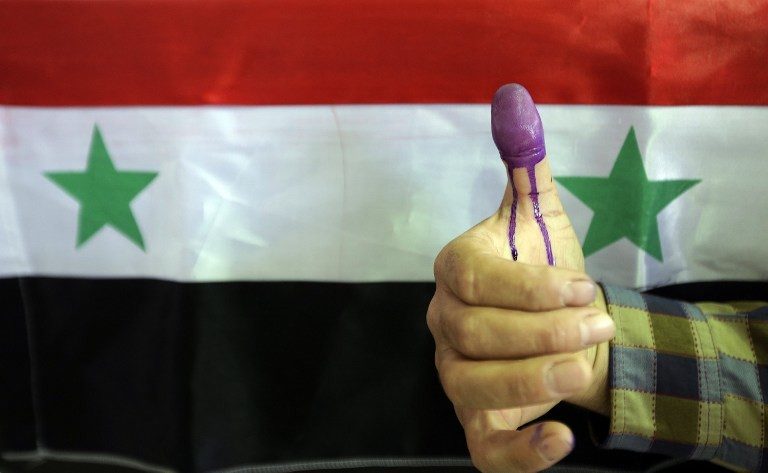SUMMARY
This is AI generated summarization, which may have errors. For context, always refer to the full article.

DAMASCUS, Syria – Syrians in regime-held areas voted Tuesday, June 3, in a controversial presidential election in which Bashar al-Assad is looking to boost his grip but which the opposition has slammed as a “farce.”
Assad is facing two little-known challengers and is expected to win, despite a massive rebellion and a three-year war which the UN has warned is likely to drag on even longer as a result of the vote.
In Damascus, the atmosphere was surreal, with people voting as the sound of shelling and explosions punctuated pro-Assad songs heard playing in the streets.
Activists in flashpoint areas said the violence raged, with rebels raining mortars on parts of the capital firmly under government control and the air force striking opposition areas.
Assad and his British-born wife Asma cast their ballots in central Damascus, the president wearing a dark blue suit, the first lady a white blouse, a black business skirt and stiletto heels.
Billboards glorifying Assad cover the streets of Damascus although inside polling stations photographs of his two challengers – Hassan al-Nuri and Maher al-Hajjar – had been put up alongside the president’s.
There was no voting in the roughly 60 percent of the country outside government control, including large areas of second city Aleppo.
Polling was held in the heart of third city Homs, in ruins after rebel forces pulled out last month following a devastating two-year siege.
At least 162,000 people have been killed in Syria since an uprising against Assad’s rule erupted in March 2011, and nearly half the population have fled their homes.
‘Voting in blood’
None of the voters questioned by AFP said they had voted for Assad’s opponents.
Nadia Hazim said she would “vote for the president – of course.”
Hind al-Homsi, 46, said she had sliced a small cut in her finger and left a bloody fingerprint on the circle underneath Assad’s name.
“I want to vote in blood for the president. He is the best,” she said.
After casting his vote in a Damascus hotel, nominal challenger Nuri said in English: “I think today’s Syria is the new Syria, the victorious.”
In the central city of Homs, security forces deployed in strength a day after a truck bomb killed 10 people in the nearby countryside.
The interior ministry said more than 15 million Syrians were eligible to take part in the election, on top of the 200,000 who already voted abroad last week.
Assad allies Iran, North Korea and Russia sent observers to monitor the election, but the opposition and NATO have both dubbed it a “farce.”
The vote “does not fulfill international standards for free, fair and transparent elections and I am sure no (NATO) ally will recognize the outcome of these so-called elections,” said the head of the powerful military alliance, Anders Fogh Rasmussen.
There was no let-up despite the vote in the army’s attacks on rebel-held areas, with air strikes pounding the towns of Daraya southwest of Damascus and Douma to its northeast, and fighting flaring east of the capital, activists said.
Distant peace prospects
The United Nations has warned the election will only complicate efforts to relaunch peace talks after two rounds of abortive negotiations in Switzerland this year.
The exiled opposition has made Assad’s departure from power a precondition for any negotiated settlement and his re-election for a new seven-year term is likely to scupper any hope of getting them back to the negotiating table any time soon.
“Dictators are not elected, they hold power by force and fear – the only motivations that Syrians have to show up for this charade,” opposition chief Ahmed Jarba wrote in the Washington Post.
Casting his ballot in Damascus, Foreign Minister Walid Muallem said however that “a political solution to the Syrian crisis begins today”.
Waddah Abed Rabbo, chief editor of pro-Assad newspaper Al-Watan, has also argued the vote could facilitate a resumption of talks.
“In Geneva, the opposition made its rejection of Assad running in the presidential election a priority at the talks. Assad was a red line that blocked everything,” Abed Rabbo said.
“Now that he will be voted back in by a majority, there will be no objection by the authorities to discuss other issues.”
Noah Bonsey of Brussels-based think-tank the International Crisis Group said the election was part of a broader effort by Assad’s government to portray its eventual victory as inevitable but that it was likely only to prolong an increasingly devastating war.
“The regime can only gain ground after reducing it to rubble, and can only hold it in so far as it remains empty of its original inhabitants,” Bonsey said.
“This was the regime’s approach before the election and it remains so after it. It leads to continued war, not victory.” – Rappler.com
Add a comment
How does this make you feel?
There are no comments yet. Add your comment to start the conversation.